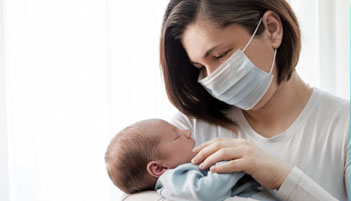HOW CAN WE HELP YOU? Call 1-800-TRY-CHOP
In This Section
Can Mothers With COVID-19 Room-In With Their Newborns?

Mothers with suspected or confirmed COVID-19 who follow recommended infection control measures may room-in with their newborn.
The findings:
Mothers with suspected or confirmed COVID-19 can room-in with their newborns when necessary infection control measures are taken, according to newly revised guidelines from the American Academy of Pediatrics (AAP). Health experts, including Karen Puopolo, MD, PhD, lead author of the guidance, based the updated recommendations on evidence from published case series and data provided to a national registry.
Why it matters:
Researchers and clinicians previously did not know the risks of perinatally and postnatally-acquired newborn infection, prompting initial AAP guidance to recommend temporary separation of newborns from infected mothers as a safety measure. Now, researchers have more information gleaned from national and international cases over a longer period of time. Clinicians may now inform families that the evidence to date suggests the risk of a newborn acquiring infection during birth hospitalization is low when infection precautions are taken, such as measures to protect the newborn from mother’s respiratory secretions. Furthermore, the data shows that the likelihood of a positive test result for SARS-CoV-2 is similar for infants separated from their mothers and those who room-in with mothers while using infection prevention measures.
Who conducted the study:
Dr. Puopolo, who is on faculty at Children's Hospital of Philadelphia and the Perelman School of Medicine at the University of Pennsylvania, is lead author of the newborn guidance. The neonatal guidance writing group also included AAP members Drs. Mark Hudak, David Kimberlin, Arun Gupta and James Cummings.
How they did it:
Dr. Puopolo and her team reviewed the evolving literature and gathered data from more than 1,500 mother-infant dyads in the National Registry for Surveillance and Epidemiology of Perinatal COVID-19.
Quick thoughts:
“I think it’s very important for people to understand where we were when guidance was first provided at the end of March-beginning of April,” said Dr. Puopolo to AAP News. “All we knew about this virus was that it was really contagious and was killing a lot of people. So it was important for us to be cautious. I’m super glad that it doesn’t seem to be a virus that is really dangerous to newborn babies, at least as far as we can currently tell.”
What’s next:
Guidance will continue to be updated, according to the AAP News report.
Where to learn more:
Read the full interim guidance, “FAQs Update: Management of Infants Born to Mothers With Confirmed or Suspected COVID-19.”


